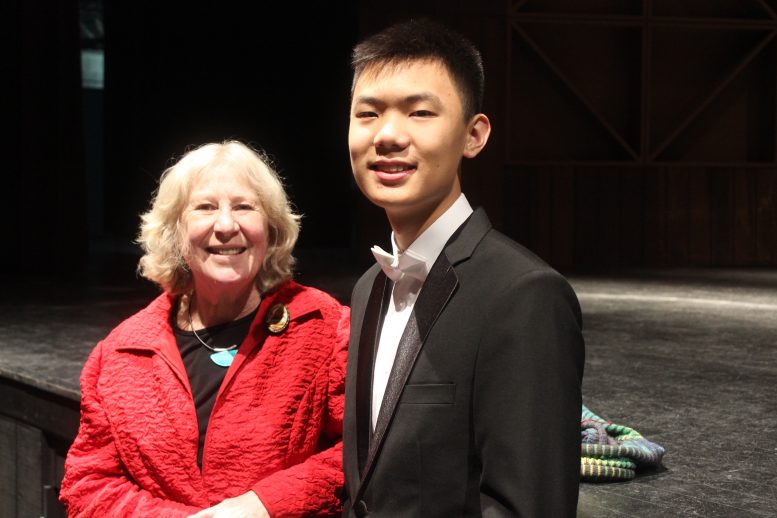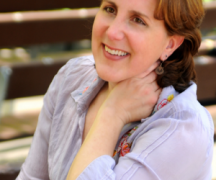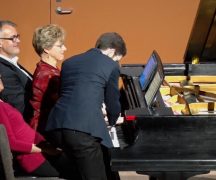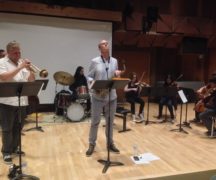By DAVID DUPONT
BG Independent News
No one landed a quadruple Lutz at the 2018 David D. Dubois Piano Competition Sunday.
That wasn’t the only difference between the kind of athletic competition seen globally and that held in Kobacker Hall on the Bowling Green State University.
There were no cheering throngs, just a handful of listeners. But then no one flopped.
No gold medals are handed out. But the winners collect checks, and all participants, even those who applied but didn’t make the semifinals are eligible for BGSU scholarships.
Collecting the $3,000 top prize, was 16-year-old Raymond Feng, of Rochester, NY. Isabelle Liau, 16, of Novi, Michigan, placed second collecting $2,000 and bettering on her third place performance in last year’s competition. Third, $1,000, went to 13-year-old Angelina Ning from Charlotte, North Carolina.
To compete classically-trained pianists in grades 8 through 12 (age 18 or younger) must prepare a 20-30 minutes long program of music from the last 500 years or so, with music from at least three stylistic periods, Baroque through contemporary. One piece must be a Classical Era sonata – Haydn, Mozart, Beethoven, and their contemporaries. All must be memorized with the exception of pieces composed after 1945. Though most finalists played a contemporary piece, none took advantage of that exception.
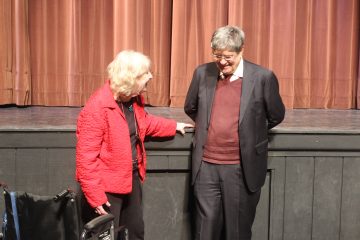
Friends for more than 50 years, pianists Ursula Oppens and Phillip Moll reunited to serve as guest artists and judges for the Dubois Piano Festival and Competition at BGSU.
The only music visible was on the judges’ table in front Robert Satterlee, of the BGSU piano faculty, and the guest artists Ursula Oppens and Phillip Moll. Behind them sat Laura Melton, also of the piano faculty, who was the driving force behind bringing the event here, and continues to direct it.
Robert Swinehart, who represents the Dubois Trust, said that staging the festival at BGSU was a wise decision. He attends every year, and every year, he said, the field of pianists improves. “This is a phenomenal event.”
He was a close friend of David Dubois for 20 years, he said. Starting as a high school math teacher, Dubois applied his knowledge to management systems beyond education in books, speeches and consulting. He also loved music, and sang in the National Cathedral choir. He wanted his estate to benefit young musicians, Swinehart said.
That took the form of the competition at BGSU as well as organ scholarship at Westminster Choir College in Princeton, New Jersey.
“He would be a very happy man to see how well the money is being used for the further education of the students,” Swinehart said.
In addition to the competition, the festival includes a master class for the university students by the guest artists, a performance by the guest artists, and scholarships to BGSU. Those are open to all pianists who participate, including those who apply but are not selected as semifinalists. The semifinalists performed Saturday.
Two Dubois scholarship recipients now study in the College of Musical Arts. Melton said she expects several from this year’s field to audition for admission.
Saturday night’s performance brought together Moll and Oppens, who have known each other since they were the age of the youngest competitors. Moll said they haven’t had that many chances to play together since they graduated from college – he from Harvard, she from Radcliffe – 50 years ago.
They’d played the Mozart concerto for two pianos with the Boston Pops in celebration of their 50th college reunion. They decided on the rest of the program, pieces by Frederic Rzewski, Francois Poulenc, and Robert Schumann with an ear toward diversity, not unlike what is demanded of the young competitors.
Moll said they prepared the program over three rehearsal sessions, two in New York City where Oppens lives and one in Berlin where he resides.
“It was a real treat, and so enjoyable,” Moll said of the performance. The Bowling Green Philharmonia, conducted by Emily Freeman Brown, performed the concerto with them.
Moll, known as an accompanist for artists such flutist James Galway and singer Jessye Norman, said the finalists he and Oppens heard Sunday were “terrific.”
Any of the award winners could have justifiably been given the top prize. It wasn’t clear cut, Moll said.
Of the winner, he said: “His playing was particularly flawless and professional, so even and well-rounded and controlled.” He added: “I was quite moved by others, too. I was so touched by their playing.”
He was even more impressed given how young they are. The average age of the finalists was 15.
Oppens was as well. “It’s amazing, just mind boggling, none were even the maximum age.”
“Now in America we have pianists from the whole world,” she said. “That’s a big difference” from when she and Moll were teenagers. “No two ways about that, they are getting better.”
She said the judges all had the same three pianists on top, but in different orders. “They all had such special qualities. They are all amazing. … The winner had the most mature interpretation.”
Feng began studying piano when he was 4. When he was a toddler he had a toy keyboard and he would play on it “for hours on end,” he said. His mother decided he needed piano lessons. Three years later he started violin lessons.
Piano is his principal musical focus, but he loves playing violin with his friends in ensembles and orchestra. He is also the conductor apprentice in the Hochstein Youth Symphony.
He has yet to decide if he will major in music when he heads off to college. He is considering studying a STEM discipline. Still he would hope to continue playing music, possibly as a double major or as a minor.
The Dubois victory adds another distinction to an already impressive resume with solo performance with orchestras in the United States and Europe, including one broadcast on National Public Radio’s “From the Top.” He has also been named a Lang Lang Foundation Young Scholar.
The biographies of the two dozen semifinalists all boast numerous competition victories.
Feng said he was drawn to the Dubois competition because other competitors have spoken highly of it and “it attracts some of the best pianists in the nation.”
Other finalists included Lucy Cao, 14, from Chicago, who received an honorable mention. Her brother, John, competed in the semifinal round.
Rounding out the field of finalists were: Kasey Shao, 14, Cincinnati; Catharine Baek, 17, Willoughby; Evan Hu, 15, Potomac, Maryland; and Andrew Chen, 17, New York City.

